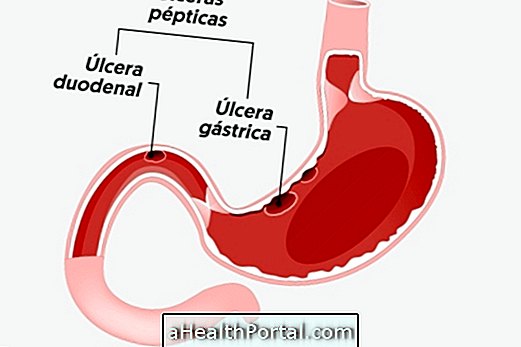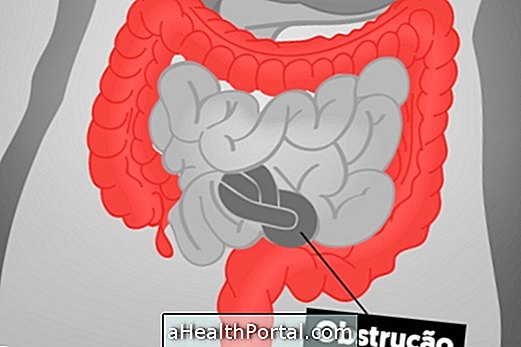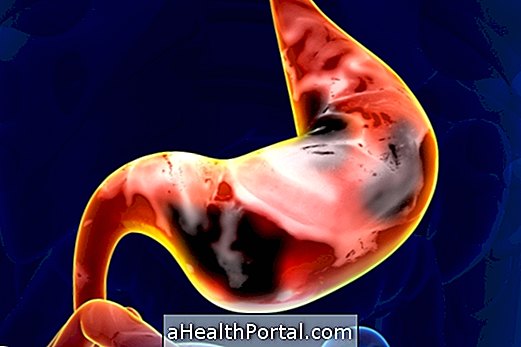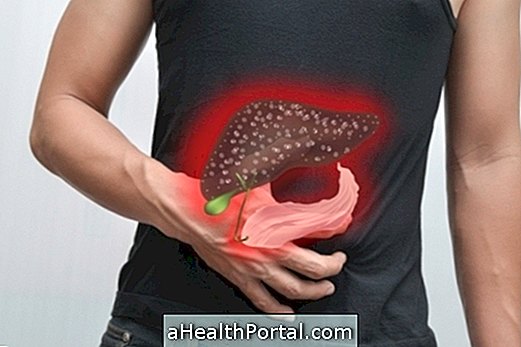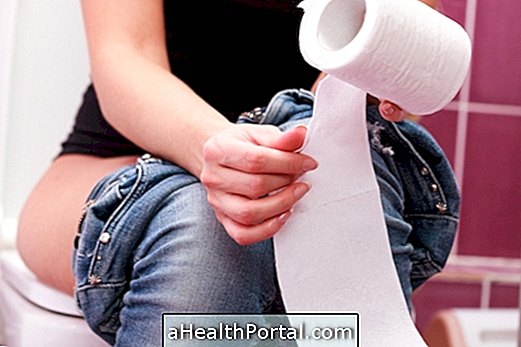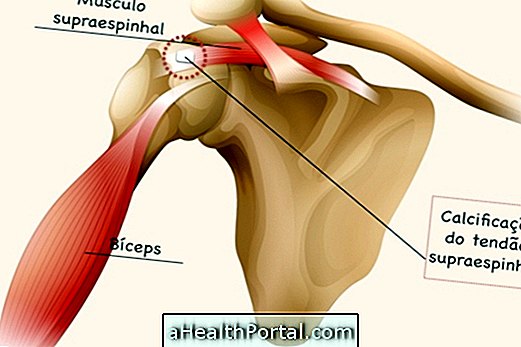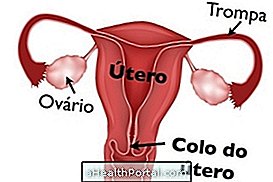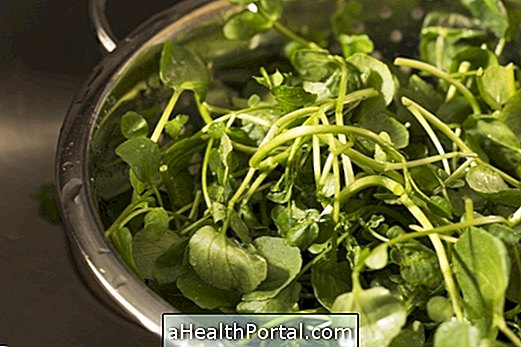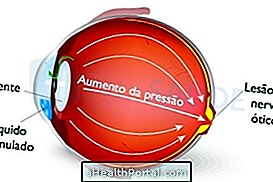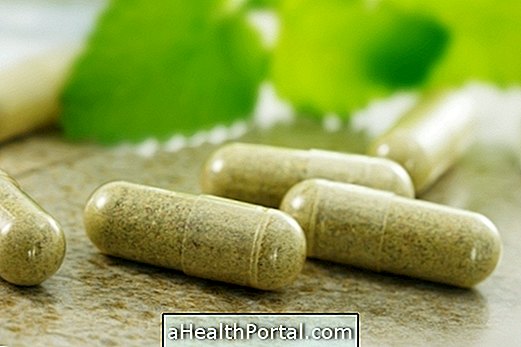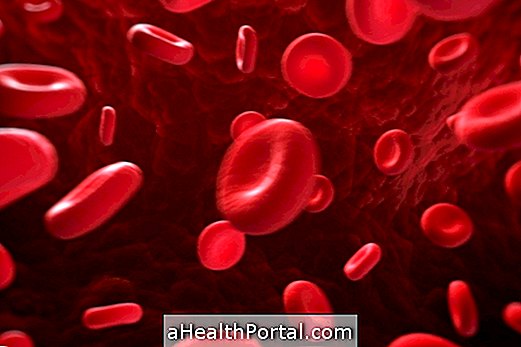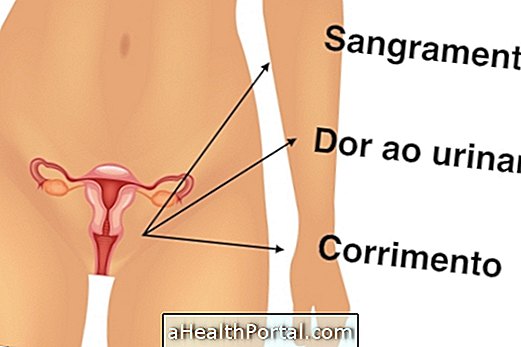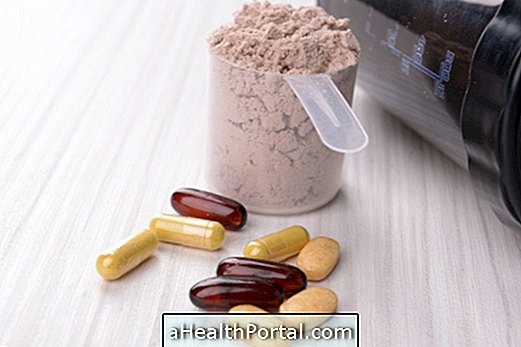There are several ways to eliminate trapped intestinal gases, but one of the simplest and most practical is to take a fennel tea with lemon balm and walk for a few minutes, because this way it is possible to stimulate the functioning of the intestine, eliminating the form gases while walking.
In cases where it is not possible to eliminate the gases only with the use of this tea, it may be necessary to use abdominal massages to avoid the excessive accumulation of gases that can cause very acute pain, which can even be confused with infarction. Find out what the gas symptoms are, to make sure you're not having a heart attack.
Strategies for releasing gases
Some excellent strategies for eliminating trapped gases are:
1. Press the abdomen to release gases
To get rid of intestinal gas quickly a good way is to compress the abdomen. To do this, you should lie on your belly up and bend your knees on top of your belly by pressing, as shown in the image below. This is also a great option to eliminate gases in infants and children as it does not present any type of health risk.
2. Giving a massage to release gases
Another very efficient alternative is to do an abdominal massage, with gentle circular motions, from the top to the bottom, as if you were pushing the gases out of the body, following the direction of the arrows that shows the second image.

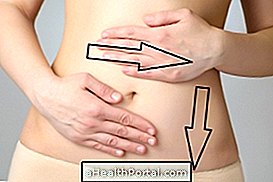
3. Taking Teas Against Gas
Taking lemon balm tea with fennel throughout the day is also a good choice because it has antispasmodic properties that, in addition to eliminating the gas, helps to reduce stitch pain in the abdominal region. In addition, the water present in the tea helps to hydrate the faecal cake, which helps to loosen the intestine. Shrimp tea is also a good option, as is ginger. Here's how to prepare each recipe and more examples of home remedies for gas.
4. Take laxative juice to loosen the bowel
Drinking a glass of papaya juice with natural yogurt, plum and oatmeal in the morning is a good strategy to start the day well, and manage to fight the trapped intestine. Just prepare the juice by pounding the ingredients in the blender and take next without unhealthy. Orange juice is also a good option to go taking throughout the day and choosing to spend the day eating only fruits can also help loosen the gut but this should not be done for more than 1 day because this is a very diet restrictive. Check out more examples of laxative fruits that can turn into juice.
5. Taking a drug from a pharmacy
Another way to eliminate the gases is to use the pharmacy remedies, which can be bought without a prescription, but with indication of the pharmacist. The remedies can cause the gases to undergo a modification, reach the bloodstream and be eliminated by breathing. Some examples are Dimethicone (Luftal), Charcoal or Almeida Prado 48. See more examples in: Remedy for gases.
If even following these guidelines, still if you continue with gases trapped you can make a clister at home to eliminate the feces and together the gases. To do this, one should buy a drug in the form of a suppository that must be introduced by the anus and that after a few minutes causes a large quantity of feces to be eliminated, which cleans the intestine and completely eliminates the arrested gases, bringing relief quickly and efficiently.
Learn more details on how to do: How to make an enema at home.
How to Eliminate Gases in Pregnancy
The accumulation of gas associated with constipation is a common situation at the end of pregnancy. In this case, what the pregnant woman can do, in addition to the techniques indicated above, is to take a laxative, under medical guidance, or make a micro-enema at home. In addition, practicing light exercise and opting for laxative fruit consumption is also a great option to eliminate the gases and end the pains they cause.
Eating less food at a time, and always prefer to take only a small amount of water along with the main meals, lunch and dinner, can also be a good strategy to consume less sugars and carbohydrates at the same time you eat one source of protein, such as meat.
Keeping the body active, practicing daily exercises, or at least 3 times a week, and maintaining activities that promote muscle contraction, such as gardening can be a good solution to avoid standing too long, just sitting or lying down, because it also harms digestion and favors the accumulation of gases. Learn more about the causes and how to eliminate the gases in pregnancy.
What can cause excess gas
Gases are constantly produced and naturally eliminated, but when there is consumption of foods that cause gas and constipation at the same time, they can accumulate in the intestine, leaving the belly hard, swollen, causing discomfort and abdominal distension. When this happens, you should avoid eating foods that cause gas and invest in those that are high in fiber, and drink plenty of water to make it easier for faeces and gas to be eliminated.
The intestinal gases are produced in greater quantity in the following situations:
Bad eating habits
When the food has not yet been fully digested and end up fermenting for longer in the digestive tract, which is directly influenced by the bacteria that naturally populate the intestinal tract of the individual. Eating more carbohydrates than usual, as can happen after going on a pizza or pasta rotation, can cause increased intestinal gas and cause stitch pain in the abdomen and leave the belly distended.
Learn more foods that cause gas, so you know what you can not eat right now in this video:

Constipation
If the person suffers from constipation, hardened stools may worsen the condition because they block the gas outflow. That way the ideal is to be able to push the stool out as soon as possible and eliminate the gas bubbles that are still inside the intestine. Remedies, teas and foods high in fiber and water can be used, but in some cases a clister or intestinal lavage may be a good solution. Check out more natural strategies to end constipation.
Excess fiber and little water
Eating more fiber in food is good, but for it to achieve its goal and facilitate the elimination of feces, it is necessary to drink plenty of water so that the faecal cake becomes softer and can slide easily through the intestine. Eating too much fiber, but not eating enough fluids, causes the food to remain longer in the intestine, taking more time to ferment, forming more gas and abdominal discomfort. Some examples of high fiber foods are papaya, oats, whole grains, fruits with peel, vegetables. Here's how to make a diet rich in fiber to regulate the gut.
Certain diseases
Situations such as celiac disease, irritable bowel syndrome, lactose intolerance, gluten sensitivity and other intestinal changes can also cause bloating and excessive gas. These changes can be diagnosed at any stage of life, so a medical appointment with a gastroenterologist can be helpful when excess gas is frequent and bothers the daily activities. Tests and tests may be requested to evaluate the habits and health of the digestive tract, but a consultation with a dietitian may also be helpful in knowing how to adjust food at each stage of life.
How to know if I have excess gases
The body is constantly producing gases, which are naturally eliminated by sitting on the toilet to urinate or defecating, and by walking or contracting the abdomen. Most of the time the gases do not smell very strongly, and it is normal to release gases, about 20 times a day. What can characterize an excess of gases is the frequency with which they are eliminated and the smell more intense, that can indicate that the intestinal health is not adequate and needs a medical evaluation.
